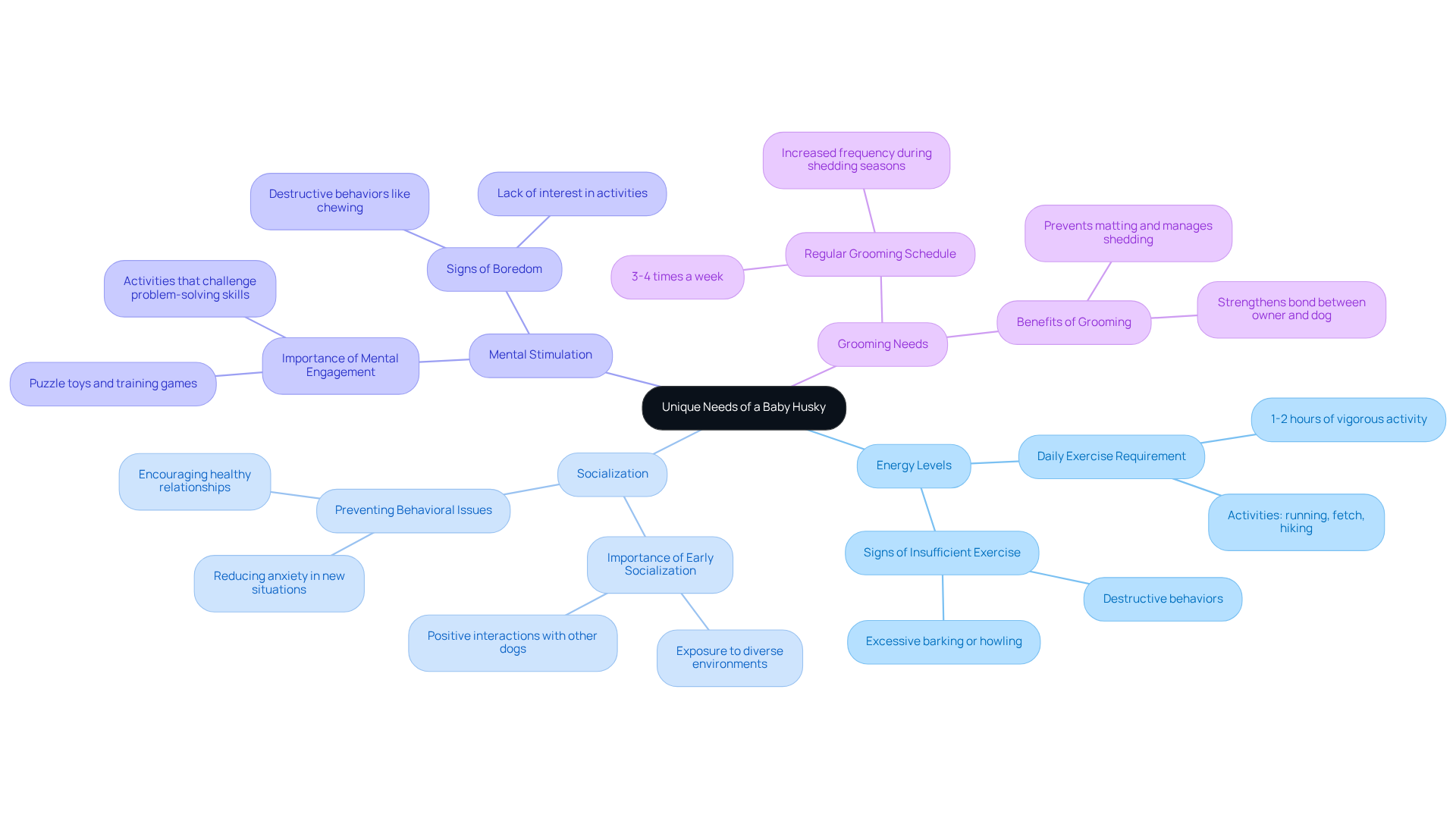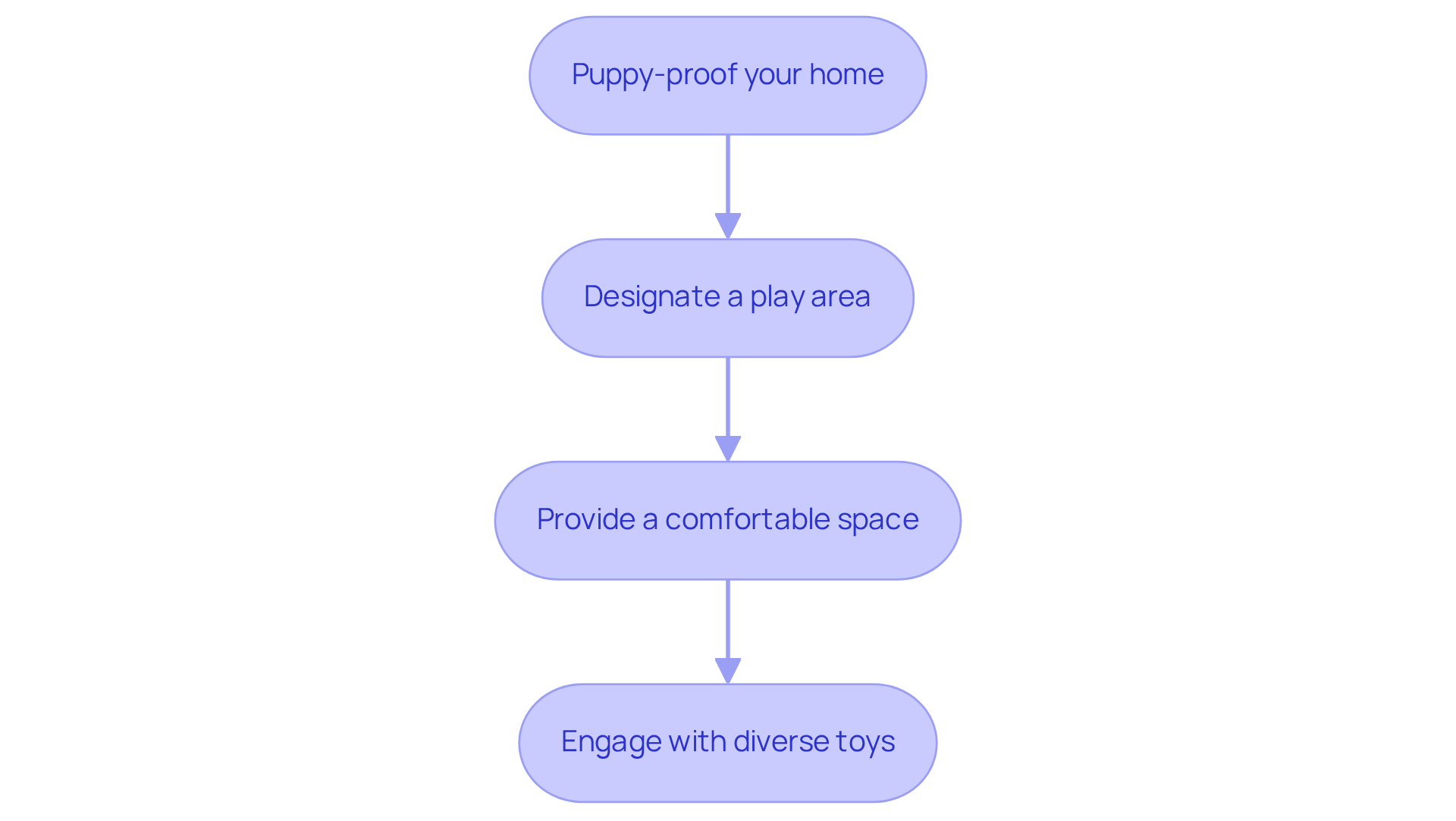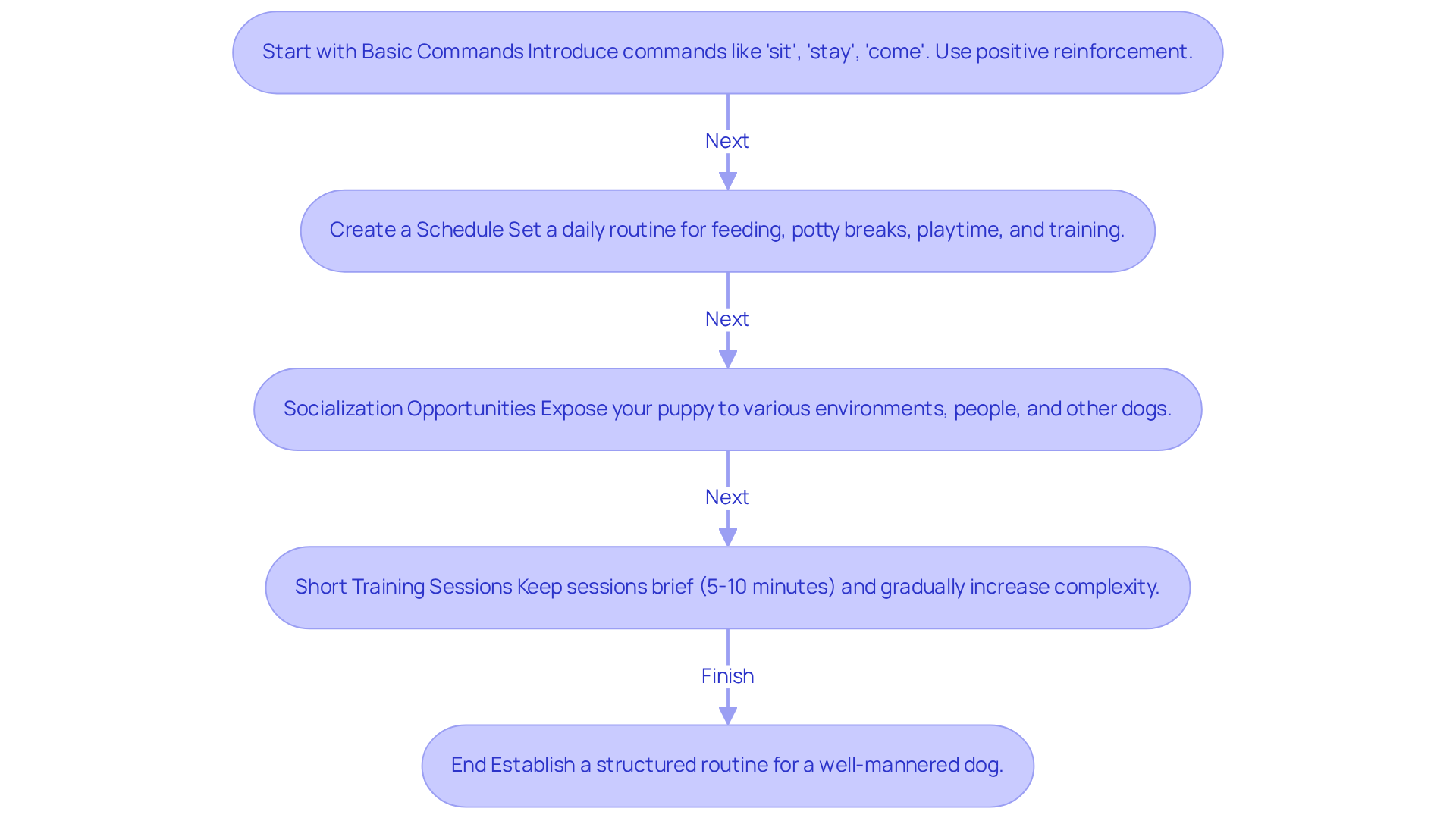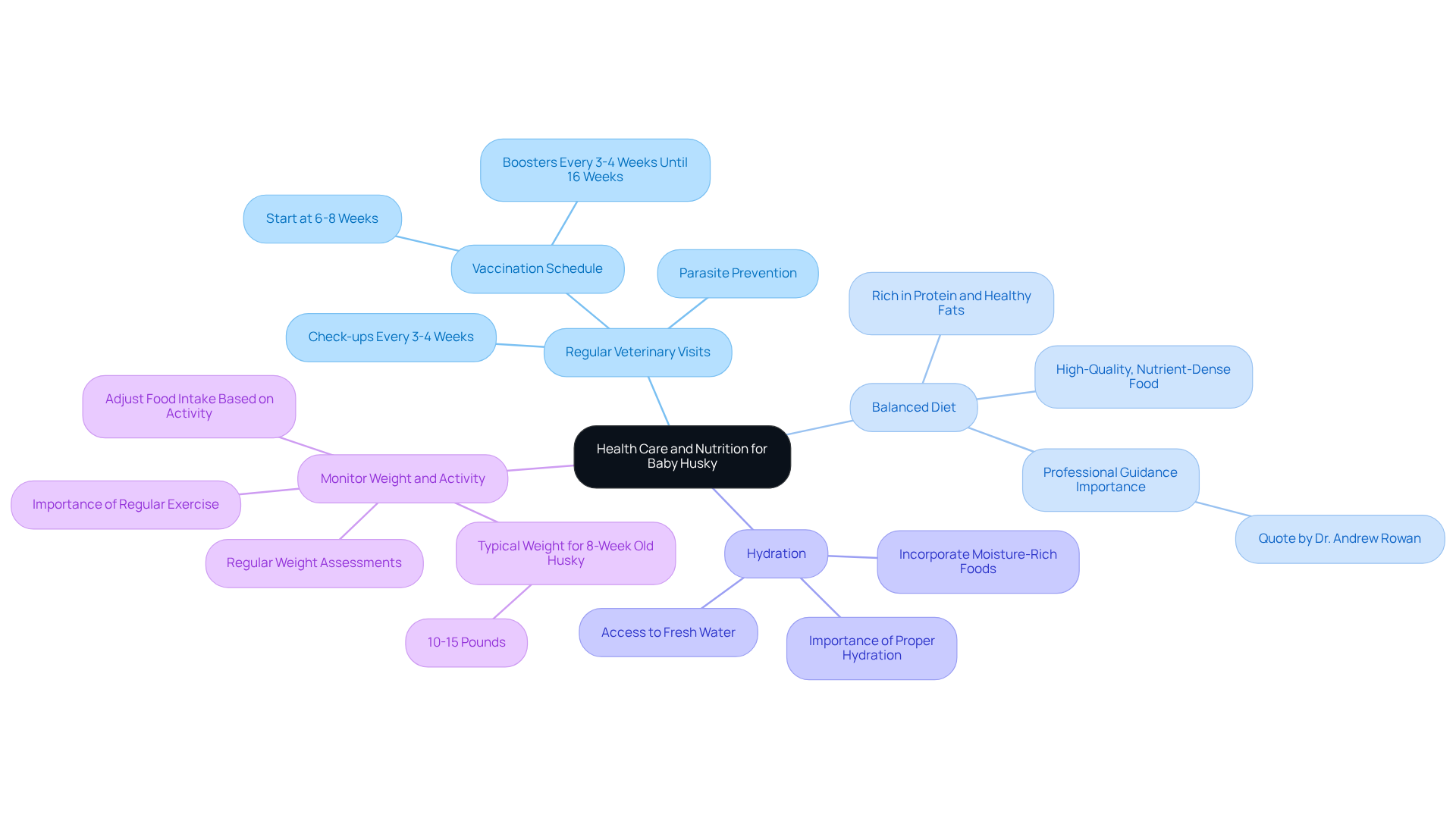
4 Essential Steps to Care for Your Baby Husky
Overview
Caring for your baby Husky involves several essential steps that ensure their happiness and well-being. It’s crucial to provide adequate exercise, socialization, mental stimulation, and proper grooming. By addressing these needs, you create a nurturing environment for this energetic and intelligent breed.
- A structured routine
- Regular veterinary care
These not only support their overall health but also foster a deep bond between you and your furry companion. Remember, your efforts in caring for your Husky are a testament to your love and commitment, and they truly deserve the best.
Introduction
Siberian Huskies, often lovingly referred to as baby huskies, are celebrated for their boundless energy and playful demeanor, making them a truly delightful addition to any household. Yet, their unique needs call for dedicated care and attention, essential for fostering a happy and healthy life.
This guide explores the vital steps that every pet owner should embrace to ensure their baby husky thrives, from crafting a stimulating environment to establishing a solid training routine.
But what are the critical factors that can profoundly impact the experience of raising a baby husky? It’s important to recognize the emotional journey that comes with this responsibility, as the bond between you and your husky is one filled with joy and challenges alike.
Understand the Unique Needs of a Baby Husky
Siberian Huskies, also referred to as baby huskies, are full of energy, intelligence, and a playful spirit. As a devoted pet owner, it’s essential to create a nurturing environment that caters to their physical and mental stimulation needs. Let’s explore some key aspects that can help you provide the best care for your furry friend:
-
Energy Levels: Huskies are an active breed that thrives on exercise. To keep them happy and healthy, aim for at least 1 to 2 hours of vigorous activity each day. This can include engaging walks, lively playtime, and rewarding training sessions. Activities like running and fetch are wonderful ways to help them burn off excess energy. Remember, this breed has one of the highest exercise demands among dogs, a reflection of their rich history as sled canines.
-
Socialization: Early socialization is vital for nurturing a well-adjusted adult dog. Introduce your puppy to diverse environments, people, and other animals to foster positive interactions. This not only helps reduce anxiety in new situations but also encourages healthy relationships with fellow dogs, which is crucial in preventing behavioral issues later on.
-
Mental Stimulation: Given their intelligence, Huskies can easily become bored, which may lead to destructive behaviors. To keep their minds engaged, consider incorporating puzzle toys and training games that challenge them. This mental stimulation is just as important as physical exercise, so look for activities that stimulate their problem-solving skills and keep them happy.
-
Grooming Needs: Their thick double coat requires regular grooming to prevent matting and manage shedding. Aim to brush your dog 3 to 4 times a week, increasing frequency during shedding seasons to maintain a healthy coat. Regular grooming not only keeps their coat in good condition but also strengthens the bond between you and your dog.
By understanding and addressing these unique needs, you can create a loving environment that promotes your young dog’s health and happiness.

Create a Safe and Stimulating Environment
Creating a safe and stimulating environment for your baby husky is essential for their well-being. As a loving pet owner, you want to ensure your furry friend feels secure and happy. Here are some caring steps to consider:
-
First, it’s vital to puppy-proof your home. Take the time to eliminate hazardous items such as electrical cords, small objects that could pose choking risks, and toxic plants. As veterinarian Sandra C. Mitchell emphasizes, overseeing your baby husky is crucial—much like how you would supervise a curious toddler. Using baby gates can help limit access to unsafe areas, allowing your dog to explore freely while keeping them out of harm’s way.
-
Next, designate a specific play area within your home where your baby husky can enjoy their freedom. This space should be equipped with toys that promote both physical activity and mental stimulation. Chew toys and interactive games can keep them engaged and happy, fostering a sense of joy in their playtime.
-
It’s also important to provide a comfortable space for your baby husky. Create a cozy sleeping nook with a soft bed and blankets, giving your dog a safe retreat for rest and relaxation. This designated area will help the baby husky feel secure and comfortable, which is crucial for its emotional well-being.
-
Additionally, engage your puppy with a diverse selection of toys that cater to various play styles. Baby huskies thrive on challenges, so it’s important to invest in treat-dispensing puzzles and toys that stimulate their intelligence and curiosity. According to dog behavior specialist Cathy Madson, establishing a solid bond founded on trust and effective communication is essential for your dog’s development.
By ensuring your home is both safe and stimulating, you are laying the foundation for a positive upbringing. Remember, young dogs can be curious and clumsy, so ongoing supervision and dog-proofing are vital to prevent accidents. Your nurturing approach will help your young dog feel secure and happy, ultimately enriching their life and yours.

Establish a Training and Socialization Routine
To establish a successful training and socialization routine for your baby husky, it’s essential to approach this journey with love and patience. Every puppy is unique, and understanding their needs can make all the difference.
-
Start with Basic Commands: Begin your training by introducing essential commands like ‘sit’, ‘stay’, and ‘come’. Remember, positive reinforcement is key; rewarding good behavior with treats and praise not only encourages your puppy but also strengthens your bond.
-
Create a Schedule: Consistency truly is the cornerstone of effective training. By setting a daily schedule for feeding, potty breaks, playtime, and training sessions, you help your dog understand what to expect and when. This structure can ease any anxiety they may feel and foster a sense of security.
-
Socialization Opportunities: It’s crucial to expose your young canine to various environments, people, and other dogs. Consider arranging playdates with vaccinated dogs and visiting dog parks. These experiences will significantly enhance their social skills and confidence.
-
Short Training Sessions: Keeping training sessions brief—around 5 to 10 minutes—will help maintain your puppy’s attention. As they master the basics, gradually increase the complexity of commands. This approach not only keeps them engaged but also allows for a positive learning experience.
By establishing a structured training and socialization routine, you are not just teaching commands; you are nurturing a well-mannered and self-assured adult dog. Your love and dedication will undoubtedly shine through in their development.

Prioritize Health Care and Nutrition
To ensure optimal health care and nutrition for your baby Husky, it’s important to embrace a few caring guidelines that will support their well-being:
-
Regular Veterinary Visits: Scheduling check-ups every 3-4 weeks during the first six months is essential. This regularity not only allows you to monitor your puppy’s growth but also helps in addressing any health concerns promptly. Vaccinations and parasite prevention are crucial during this time, as they protect against common illnesses and ensure your furry friend’s well-being. The American Veterinary Medical Association recommends a series of vaccinations starting at 6-8 weeks of age, with boosters every 3-4 weeks until they reach about 16 weeks old.
-
Balanced Diet: Providing high-quality, nutrient-dense food specifically formulated for large breed young dogs is vital. Look for options rich in protein and healthy fats, as these nutrients are essential for supporting their growth and energy needs. As Dr. Andrew Rowan wisely states, “A veterinarian’s job often begins where that of a doctor ends,” highlighting the importance of professional guidance in nutrition.
-
Hydration: Ensuring your young dog has access to fresh water at all times is crucial. Huskies can sometimes be selective drinkers, so consider incorporating moisture-rich foods into their diet to enhance hydration. Proper hydration is vital for maintaining overall health and supporting bodily functions, as dehydration can lead to serious health issues.
-
Monitor Weight and Activity: Regularly assessing your dog’s weight and adjusting their food intake based on their activity level is important. Engaging in regular exercise is essential to prevent obesity and promote overall health. Remember, the typical weight for a Siberian puppy at 8 weeks is approximately 10-15 pounds, and maintaining a healthy weight is key to their growth.
By prioritizing these aspects of health care and nutrition, you will be setting your baby husky on a path to a long, healthy, and happy life, filled with the love and joy they bring into your home.

Conclusion
Caring for a baby husky is a journey that requires an understanding of their unique needs, as well as a commitment to providing a nurturing environment that fosters both their physical and emotional well-being. It’s essential to focus on key aspects such as:
- Exercise
- Socialization
- Mental stimulation
- Grooming
By doing so, pet owners can create a loving home where their energetic and intelligent companions can truly thrive.
Consider the importance of regular exercise to meet their high energy levels; without it, your husky may become restless and anxious. Early socialization is equally vital, as it promotes healthy behaviors and helps your puppy navigate the world with confidence. Additionally, offering mental challenges keeps them engaged and satisfied. Creating a safe and stimulating environment, establishing a consistent training routine, and prioritizing health care and nutrition are all crucial steps in raising a happy and healthy husky.
Ultimately, the journey of caring for a baby husky transcends mere physical needs. It is about nurturing a strong bond built on love, patience, and understanding. By embracing these essential care tips, you can ensure that your husky grows into a well-adjusted adult dog, bringing joy and companionship into your life for many years to come. Remember, you are not alone in this journey; together, we can ensure our furry friends lead fulfilling lives filled with love and happiness.
